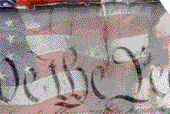|
|
Don Feder
A conservative dissent on the flag-burning amendment
 LAST WEDNESDAY, AN ANTI-FLAG-BURNING amendment was introduced in the United States
Senate with 54 co-sponsors. In 1997, it passed the House by a vote of 310-114.
LAST WEDNESDAY, AN ANTI-FLAG-BURNING amendment was introduced in the United States
Senate with 54 co-sponsors. In 1997, it passed the House by a vote of 310-114.
If the Senate follows suit with a two-thirds majority, and three-quarters of the states ratify, it will become the 28th amendment to the constitution.
Much as it pains me to say it (I love the flag and -- and as the Pledge of Allegiance says -- the republic for which it stands), the amendment is a bad idea.
First, the return doesn't justify the expenditure. Several pending amendments are crucial to the general welfare. A balanced-budget amendment may finally tame the monstrosity of deficit spending. Despite current rosy forecasts, the national debt exceeds $5.4 trillion.
A term-limitation amendment would treat the cancer of career politics. A right-to-life amendment would stop the annual slaughter of 1.5 million unborn children.
Do you know what a flag-burning amendment would do? It would allow states to assess a fine. Does anyone really believe that a $100 fine will deter the creeps who feel compelled to burn the flag as a sign of protest?
I find myself in the uncomfortable position of agreeing with civil libertarians on this one. Flag-burning is a form of symbolic speech, which loathsome as it is, merits protection.
Justice Antonin Scalia, the most conservative member of the Supreme Court (who voted with the majority to strike down a Texas flag-burning prohibition in 1989), agrees with me.
"I'm sorry you can burn the flag," Scalia told an audience at the University of Baltimore Law School in 1995. "I don't like scruffy people burning the flag. It's perfectly awful." Scalia continued that attempts to ban the same were clearly unconstitutional.
Many claims regarding the First Amendment are erroneous. For instance, it does not protect pornography, an assertion that would have astounded the Founding Fathers.
While every form of speech isn't covered by the Bill of Rights, political speech is. Flag burning, which invariably is committed in the context of a demonstration, makes a political statement -- that the demonstrators despise this nation, and its history, values and institutions. That is the quintessence of protected speech.
The flag amendment is spearheaded by veterans' groups. Vets fought for their country under the American flag. Some saw buddies die on foreign battlefields. When the coffins came home, they were draped in that banner. I can only imagine the emotions that they must feel on witnessing flag desecration.
The question then becomes: Do hurt feelings justify abridging speech?
In another context, the left believes they do. Campus speech codes, which liberals generally favor, are an effort to punish offensive language.
Spokesmen for minority groups have declared that certain words and ideas injure them. In response, liberal administrators have rushed to soothe the pain by banning the speech.
Worse, speech codes often are used not just to eliminate offensive language but to quash legitimate debate, by forbidding the expression of certain concepts.
The flag amendment is patriotic political correctness, an attempt to punish behavior that hurtfuI feelings. It is justified by the same rationale as speech codes.
Let me pose the following hypothetical to test my resolve in this matter. Let's say an antisemite purchased some Torah scrolls to burn -- as a way to express his hatred for Mosaic law, Jews or the State of Israel.
I can't imagine anything that I would find more abhorrent, which would cause me greater anguish. Much as I love what the flag represents, the Torah, which is the word of God, means more to me.
Although it would pain me to see such an act committed, I would have no right to prevent it. Offense, psychic pain, does not constitute legitimate grounds for state action.
Among my earliest memories are seeing the Stars and Stripes carried in a Memorial Day parade. I still get a catch in my voice when I recite the Pledge of Allegiance or sing the Star Spangled Banner.
When my father, a World-War II veteran, was buried, our family was presented with a flag, which rests on the mantle in our living room.
But, in the end, the flag is a piece of cloth -- the symbol of our national ideals and
aspirations. Diminishing the ideal to protect the symbol makes no
2/5/98: We get the leaders we deserve
2/2/98: Send a signal that could penetrate boardroom doors
1/27/98: State of the president: hollow rhetoric
1/25/98: For Monica's playmate, we have no one to blame but ourselves
1/22/98: At Yale, bet on yarmulke over gown
1/19/98: Commission tackles America's fastest-growing addiction, gambling
1/15/98: Capital punishment and the hard case: no exceptions for Karla Faye Tucker
1/12/98: Partial-birth abortion and the GOP's future: the "big tent" meets truth in advertising
1/8/98: IOLTA: the Left's latest scam to crawl into our pockets
1/5/98: Connect the dots to create a terrorist state
1/1/98: The Unacceptables of 1997: Long may they rave
12/28/97: Hypocrisy is a liberal survival mechanism
12/23/97: Chanukah is no laughing matter
12/22/97: No merry Christmas for persecuted Christians around the world
12/18/97: Bosnia, Haiti, and how not to conduct a foreign policy